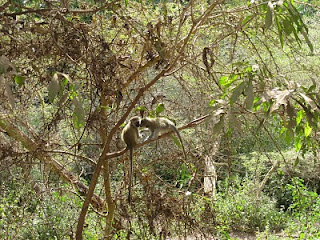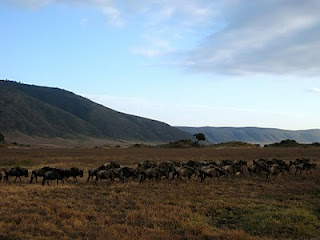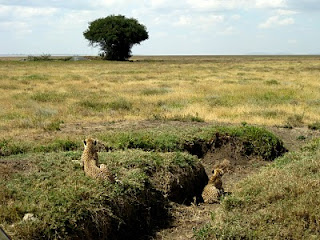 Monkeys at Lake Manyara
Monkeys at Lake Manyara Hippos at Ngorongoro
Hippos at Ngorongoro Wildebeest Migration at Ngorongoro
Wildebeest Migration at Ngorongoro Cheetahs at the Serengeti
Cheetahs at the Serengeti Elephant in the Serengeti
Elephant in the SerengetiI went on a 4 day, 3 night safari last weekend, with a company called Soko--I highly recommend them. Our guide, Mohammed, was very dillegent about waking us up at 5:30 am so we could get into the car by 6, drive down before everyone else woke up, and see the sunrise and early morning animal activity. He would spot things that other guides totally missed, and he'd be able to see things from very far away. We'd be driving, and then he'd stop and point at a speck in the distance, in the tall grass, and be able to identify what animal it was. When watching the big cats, he was very informative, and would be able to predict certain actions--he could tell by how the animal was sitting that it was about to get up and walk around, and he'd be able to tell whether the big cats were seriously going to make a move on their prey (as opposed to just watching them) and estimate how much time it took. He would use his radio to call other guides to ask them if they found anything cool, then he'd drive like mad to get us there on time so that we could see it. We probably massively overtipped him, since the tipping system here is different, but he did such a good job that I'm not upset about it.
Our cook was also very good. I ate better on safari than I do at home. He was very dilligent about not wasting--if we had left over food from dinner, he would use it to make something delicious for breakfast or lunch the next day.
So, actual details about the Safari:
Lake Manyara:
This is a gorgeous lake. When we were looking at safari companies, a lot of people told us to skip the lake, but I thought it was really nice. When we drove out, it really looked like a scene from the lion king, with the bright sun, the acacia trees, the reddish brown mountains, and big, white birds flying in a spiral in the sky. The actual lake had hundreds of white storks in the water, and dozens of hippos. Hippos are supposedly very aggressive in defending their territory, though they are vegetarian--essentially, they won't eat you, but they will kill you. We also saw tree climbing lions, which is somewhat rare. These lions are the same species as in the Serengeti, but in Manyara they have adapted to climbing and sleeping in trees, like leopards. It is because Manyara has so many forests as opposed to the Serengeti, which is mostly plains. Our first night of camping was quite comfortable. Mohammad told us to always buy things with him, because the locals would try to charge us absurd prices. Surprisingly, I did not get bitten much by mosquitoes--in Arusha I get about 1 or 2 bites per day, but I think I only got 1 during my entire safari.
Masai Village:
Mohammad asked us if we wanted to stop by a Masai village. It was an extra 15,000 shillings, but it was a very interesting experience. Cultural tourism however, if supposedly a great experience, but I can't help but feel bad about it. I wonder how much of the "cultural" performaces are actually a part of their culture, or something concocted to show tourists. I studied Taiwanese aborigines, and many of them complained that cultural tourism for their tribes were fake, and the performances were staged to look exotic. Anyhow, I still liked the Masai village, because we could see the houses that they lived in. They performed a welcome dance, and the men and the women dance separately. The Masai jump very high, so they had us go jump with them. Thier huts are made with cow dung, and women build the huts--one hut for one wife. The men have multiple wives, and if they want to pick a chief, they often pick the man with the most wives, the reasoning being that if he can manage that many wives, he can manage a village. The chief of that village had 22 wives. As for the women, they can only have one husband. Totally not equal. Their houses are made by hand, and quite small, so you have to duck to walk into them. Inside, they have beds made of wood and cow hide, as well as a fireplace for cooking. Three people lived in the hut that we visited, in a very small space. Someone commented to me that the Masai have cell phones and modern looking watches, and was upset by this. I of course, do not think it is anything to be upset about. After all, it is not fair for us to dictate that they reject all modern technology when we ourselves are swimming in it. I also think you can choose to retain certain traditions, while adapting to the modern world. I bet cell phones help a lot--they have to walk so much each day (children often walk 4 hours a day just to get to school), it's nice to just be able to call people (there is reception out there) as opposed to walking hours to find them. The masai did try to sell us a bunch of stuff, at exorbitant prices (one man charged us 25,000 shillings for a beaded bracelet that was actually about 2,000 shillings). From the Masai village, we went on to the Serengeti.
Serengeti
The Serengeti is an expansive golden plain, with dark blue mountains in the distance and acacia trees dotting the landscape. It is amazing, because the plains seem to go on forever. During our first day in the Serengeti, we saw a Hyena by the side of the road. It was looking kind of ragedy, so I thought perhaps that it had come out there to die. After all, Hyenas are pack animals, and at least for dogs, a dying individual will separate from the group. I think that is very sad though, to die alone. So, hopefully he was just mad at his group or something, and wanted some alone time. We saw many gazelles. They hop like rabbits. Towards the end of the day, we saw a leopard in a tree, but it was quite far. We also saw lions stalking some gazelles; one had a collar for research. That night, we went back to our campsite. This site is more dangerous than the Manyara site, because it is just in the Serengeti and the animals can just come around our tents. Ashley was worried abot lions attacking us, so we asked Mohammad how often lions come into the campsite; Mohammad said "quite often, but don't worry, they will not come tonight, they will probably come tomorrow instead". After dark, it isn't even safe to walk to the bathroom, so you are supposed to just go outside the tent. We briefly contemplated just bringing a can with us into the tent, so we wouldn't have to leave it. That night, I heard growling, but I convinced myself that it was Ashley breathing funny. It turned out that lions and hyenas were indeed walking around our tents that night. Mohammad was telling us that once, they woke up and a herd of wildebeest were around the tents, and just 3 meters away the lions killed one. Anyhow, no one got attacked by lions, and we were in our car by 6:30 am to see more of the Serengeti. We saw many elephants and giraffes. One elephant almost charged our car; we had been snapping photos of this herd, and the male comes up to us, clearly pissed. Mohammad tells us all to be very quiet, because the elephant is debating whether we are a threat or not. Then, the elephant backs up, and Mohammad drives away, because when they back up while facing you, it means they are backing up to give themselves room to charge at you. As we were driving, Mohammad saw a speck, and thought it was a Hyena. Then he goes, "Shit it's a leopard!" Leopards are quite rare. This one was stalking a gazelle. It was cool to see the leopard actually moving (usually when people see them, they are sleeping in the tree). The gazelle escaped though. Supposedly the leopards are the most efficient hunters, and they prefer smaller prey, like gazelle, because they like to take it up to their tree and eat it there. We saw a pride of lions, but they were quite far away. At one point however, a lioness walked along the road, and we followed her for some time.
Olduvai Gorge
The masai said it should be called Oldupai, since it is called Olduvai because the foreigner asked the Masai the name, and then misheard them and wrote it down wrong. Oldupai is a type of plant that grows abundantly in this gorge. This gorge is famous because it is where they found a skeleton of the early humans, the austrolopithecus (probably spelled that wrong). They also found footprints preserved in the ash, proving that these early humans walked upright.
Ngorongoro Crater
The crater was my favorite part of the entire trip. It was freezing cold, but luckily my apartment mate Will, who went last week, warned me about the cold, so I brought plenty of layers and an extra blanket; I borrowed gloves as well. When we arrived at the camp, there were four elephants walking among our tents, going to our water tanks and stealing our water. Then, they went to the tree, and started breaking off branches. Mohammad had shown us another area in which the trees were completely destroyed, and he said elephants were the culprit. Surprisingly, they did not trample our tents, but walked around them. We left our camp, the next day, at 6:00 am. The sunrise over the crater was beautiful, it is amazing how the land will just change colors throughout the sunrise, from a light blue under the moon, to a lighter yellow, then orange, reddish, and then back to a yellow. During noon, the green and blues of the grass and water are more vivid. Early in the morning, we saw the most amazing cheetah hunt. The cheetah has become my new favorite animal because it is so graceful. There were two of them. One of the was approaching a group of gazelles (Cheetah 1), while the other went on the road, around our car, to the opposite side (Cheetah 2). Cheetah 2 is farther, but then suddenly takes off like a bullet. Their stride is about 23 feet, so this cheetah is just ripping through the tall grass at the gazelles. The gazelles freak out of course, and run the opposite direction, but they don't realize that Cheetah 1 is waiting in the grass there. They run directly at Cheetah 1, who makes a beeline towards them. Somehow, the gazelle manage to jump or dogde Cheetah 1, so now both Cheetahs are chasing the gazelles. The distance that they covered was amazing--I would say they covered around 100 km, but I'm not that good as estimating. Basically, they ran from one end of a mountain range to the other. The gazelles got away, even though we were all rooting for the cheetahs. After the gazelles crossed the road, the cheetahs just collapsed. They must be very exhausted. Cheetahs are supposedly the most inefficient hunters because they expend so much energy. While the lions and the leopard will wait to get very close to their prey, the Cheetah will just take off from farther away, precisely because it is so fast and can get to the prey much faster than the lions or the leopard. Supposedly the cheetah hunts are successful only 10% of the time. After running, they have to recharge, so often they will kill, relax, and then eat. The problem is however, that other big cats will steal their kill, since cheetahs are not particularly strong--they are built very slender, unlike the lions and the leopards.
In the crater, the zebra and the wildebeest walk in a single file line. The line will stretch out far into the horizon, and usually end with a huge group of them by a water source. At one point, a pride of lions was waiting by the line. We initially only saw two of the lions, but over some time we kept seeing them pop their heads out of the tall grass and move closer to the wildebeest. They were waiting, 4 lioness and 2 young male lions, to make a move, but never did. Eventually, the line ended and they missed their chance, so they reconvened, as though they were having a meeting about what went wrong :D Then they moved on to another group.
After going on safari, I cannot support zoos anymore. I think it is especially cruel to keep those big cats in cages. Even a large cage cannot compare to what they have in the wild. A cheetah could never run like that in a zoo...although I suppose perhaps the cheetah is happy, since it doesn't have to keep hunting stuff. I'm not quite sure. I guess it might be nice to have people feeding you all the time, while you lie there and get your picture taken, but seeing these animals in the wild really makes me think that they are far better off there. Especially birds--I think to keep a bird in a cage so that it can't fly is awful. Imagine being able to fly, but not being allowed to. As a child, I had many pets in cages, but I will never be able to get a pet that is kept in a cage again.
East Africa is really amazing, and I think everyone should visit it at least once in their lifetime.


